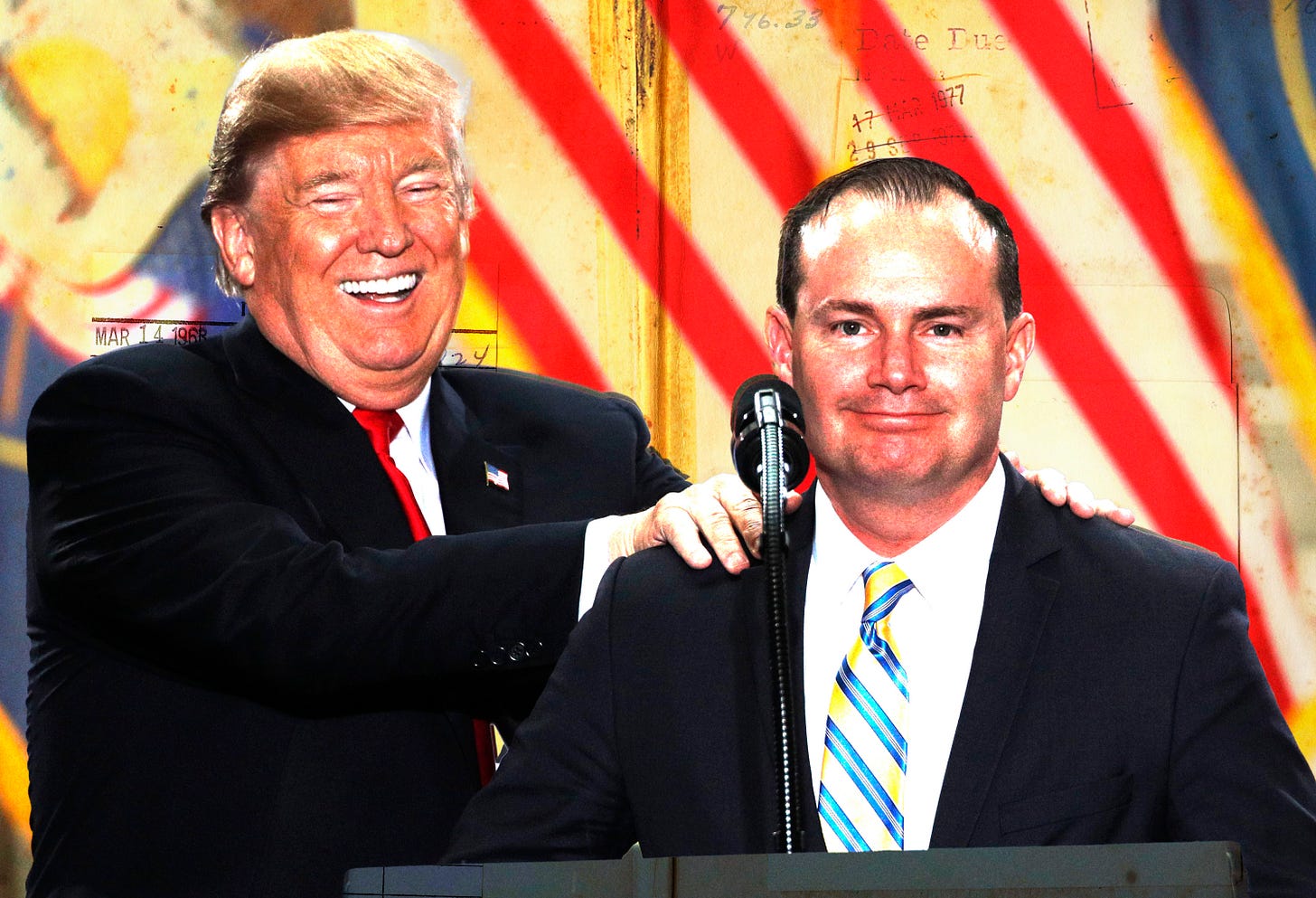How Mike Lee Ditched Constitutional Conservatism for the Cult of Trump
The senator, lawyer, and author of books on the Founding is ignoring the constitutional crisis right in front of his nose.

I didn’t watch much of this year’s CPAC. My digestion is sound, but there’s no point in taking unnecessary risks. Still, I did note the presence of Sen. Mike Lee, a legislator who styles himself a “constitutional conservative.” Lee is the son of a distinguished former Solicitor General of the United States, a graduate of Brigham Young University and its law school, and the author of three books on the Founding era: Our Lost Constitution, Our Lost Declaration, and Written Out of History: The Forgotten Founders Who Fought Big Government. That’s a lot of losing and forgetting.
But it seems that Lee is the one who has forgotten what the Founding was about.
Less than two months have elapsed since Donald Trump committed the most monstrous attack on the constitutional order in 150 years by siccing a violent mob on the Congress as it was attempting to certify the election of the man who defeated him. That came on the heels of attempts to strong-arm the secretary of state of Georgia to “find” enough votes to alter the results, efforts to persuade state legislators to defy the voters and replace their states’ electoral college slates in his favor, and a protracted effort to discredit the election process itself as fraudulent.
CPAC was the first gathering of Republicans and conservatives since those events. And yet, the “constitutional conservative” Lee did not see fit to mention any of that in his address. He spoke of “leftists who hate the Bill of Rights” and he argued that “faith in government is tyranny.” He denounced Democratic governors, who had imposed what he regarded as overly restrictive COVID rules, as tyrants and stressed that “we” (meaning Republicans) “trust the people.”
Lee may be sincere in his desire to restore some equilibrium to the separation of powers. He has introduced several bills that would curtail executive authority, and when Trump usurped legislative powers and arguably broke the law by declaring a spurious border emergency, Lee was among a small number of senators who opposed him. But that burst of independence must have exhausted the senator, because at the time of Trump’s first impeachment trial less than a year later, Lee was among Trump’s firmest defenders. “What he did was not impeachable,” Lee told Politico. “It was not criminal. And I don’t think what he did was even wrong.”
CPAC was, according to The Bulwark’s Tim Miller, a festival of forgetting. If the Capitol insurrection was mentioned at all, it was only to blame it on judges who ruled against Trump’s risible lawsuits. Mostly though, the speakers stuck to Antifa and imaginary late-night ballot dumps.
If Lee is genuinely concerned about the constitutional order, his highest priority should be the authoritarian turn that the Republican party has taken under Trump. He might begin with these facts: Nearly two-thirds of the Republican House caucus, along with eight senators, voted not to certify President Biden’s election. Seventeen Republican state attorneys general signed onto Texas’s preposterous lawsuit challenging the results in Pennsylvania, Michigan, Georgia, and Wisconsin. (The Supreme Court tossed it.)
The MAGA crowd stormed the Capitol and erected a gallows, but elected Republicans helped prepare the ground.
Any “constitutional conservative” surveying the wreckage of the post-Trump GOP must be concerned about the state of the people they are so ready to “trust.” Can self-government succeed when a plurality of one of the two major political parties no longer even believes in democracy?
A survey of Trump supporters, who number about half the Republican party, found that not only do they nearly universally believe the fraudulent election lie, but 70 percent want Trump to serve another term and remain in office after his second term is complete.
Among Republicans more broadly, 86 percent opposed conviction and disqualification in the second impeachment trial, and 83 percent thought the trial itself should never have happened. In other words, not even attempting to subvert the election through improper influence, pressure, and eventually violence was enough to break their cult-like devotion. Sixty-five percent do not believe Biden was legitimately elected. Nearly 30 percent of Republicans believe the chief claim of the QAnon conspiracy, that Trump was secretly fighting a cannibal cabal of child -abusing Democrats and Hollywood elites. Half of Republicans aver that Antifa, not MAGA supporters, rioted at the Capitol.
Lee waxed indignant about some regulations instituted legally by Democratic governors to deal with a 100-year emergency. Did some go overboard? Maybe. Is that a threat to the Republic? Good God, no.
On the other hand, a significant portion of the electorate is slavishly loyal to a person rather than a party, a philosophy, or a country. A huge number of Americans have had their faith in democracy significantly eroded. A large minority of the population believes pernicious falsehoods and cannot be disabused. And leaders who hold advanced degrees and write books about the Founding cannot bring themselves to confront that reality. That seems like a bigger challenge.


